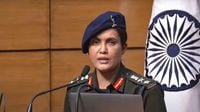In a stark contrast between symbolism and reality, Colonel Sofia Qureshi, an officer in the Indian Army, recently stood as the face of India’s military response to terrorism during a press briefing about Operation Sindoor. This operation was launched following a devastating attack in Pahalgam, Jammu and Kashmir, that resulted in the deaths of 26 Indian civilians. Qureshi, alongside Wing Commander Vyomika Singh, detailed the retaliatory strikes against terrorist training camps in Pakistan, presenting a narrative of strength and leadership that has become emblematic of India’s military ethos.
However, while Colonel Qureshi represents a narrative of national valor, the voices of ordinary citizens like Fathima from Uri bring forth a different perspective. As her village endured shelling from the Pakistan Army, Fathima questioned the Indian government’s commitment to the safety of its people. “Where should I go with my three children when my village is being pounded by bombs?” she implored, highlighting the stark realities faced by those living in conflict zones.
The juxtaposition of Qureshi’s symbolic role and Fathima’s lived experience raises critical questions about governance and accountability. While Qureshi’s achievements are celebrated, Fathima’s plea underscores the government’s failure to ensure basic safety for its citizens. The recent shelling that killed 15 individuals in a village near the border serves as a grim reminder of the human cost of conflict.
Fathima, along with others like Ranveer Kaur from Poonch, has been vocal about the lack of safety measures in their regions, which lie perilously close to the border. “Why were no safety arrangements made for us? Why were no evacuation drills conducted?” they ask, pressing the government for answers that seem to evade public discourse during this nationalistic fervor.
The government’s focus appears to be on crafting a narrative of strength and unity, often sidelining the voices of those who are suffering. This was evident in the aftermath of the April 22 killings of tourists in Baisaran, where the media spotlight shone brightly on the incident, overshadowing the ongoing tragedies faced by local civilians.
Colonel Sofia Qureshi, who has served in the Indian Army since 1999 and has a distinguished record, including a critical role in the 2006 UN peacekeeping mission in Congo, is celebrated as a national hero. Her marriage to Colonel Tajuddin Bagewadi, also an officer in the Army, further cements her status within the military community. Ghouse Sab Bagewadi, her father-in-law, expressed immense pride in her accomplishments, noting how the family has been recognized in their community since her media appearances.
However, the celebration of individual achievements must not overshadow the collective responsibility of the government to protect its citizens. As Fathima’s story illustrates, the realities of war extend beyond the battlefield to the homes of ordinary people who bear the brunt of conflict.
“How can a government that is solely focused on division and disruption worry about the safety of any section of society?” Fathima’s question resonates with many who feel neglected in the face of nationalistic rhetoric. The critique is not merely about military strategy but about the fundamental duty of the government to safeguard its people.
Colonel Qureshi’s military lineage is notable, with a family history steeped in service to the nation. Her grandfather served in the British Indian Army during the 1857 uprising, and her father fought in the 1971 India-Pakistan war. This legacy of service is commendable, yet it raises the question of whether such military traditions translate into effective governance and protection for civilians today.
As the nation rallies around figures like Colonel Qureshi, it is crucial to remember that the safety and security of citizens like Fathima should be paramount. The government must address the concerns of those living in conflict zones, ensuring that they are not merely collateral damage in the narrative of national pride.
Furthermore, the contrasting images of Qureshi’s confident press briefings and the anxious faces of civilians under threat highlight a disconnection between military triumphs and the everyday struggles of citizens. The media’s portrayal of military success often neglects the ongoing humanitarian crises that unfold in the shadows of these narratives.
In a recent press conference, Colonel Qureshi articulated the strategic objectives of Operation Sindoor, emphasizing the need for a strong military response to terrorism. Yet, as she spoke, the voices of those like Fathima remained unheard, their pleas drowned out by the celebration of military might.
As India continues to navigate its complex relationship with Pakistan, it is imperative that the government balances its military ambitions with the responsibility to protect its citizens. The question remains: will the government prioritize governance over valor, ensuring that the safety of ordinary people is not sacrificed at the altar of national pride?
In conclusion, the narratives of Colonel Sofia Qureshi and Fathima from Uri serve as a poignant reminder of the dual realities of conflict—one of celebrated military leaders and the other of vulnerable civilians. As the nation moves forward, it must strive to create an India where the safety and dignity of every citizen are upheld, regardless of the prevailing political narratives.



